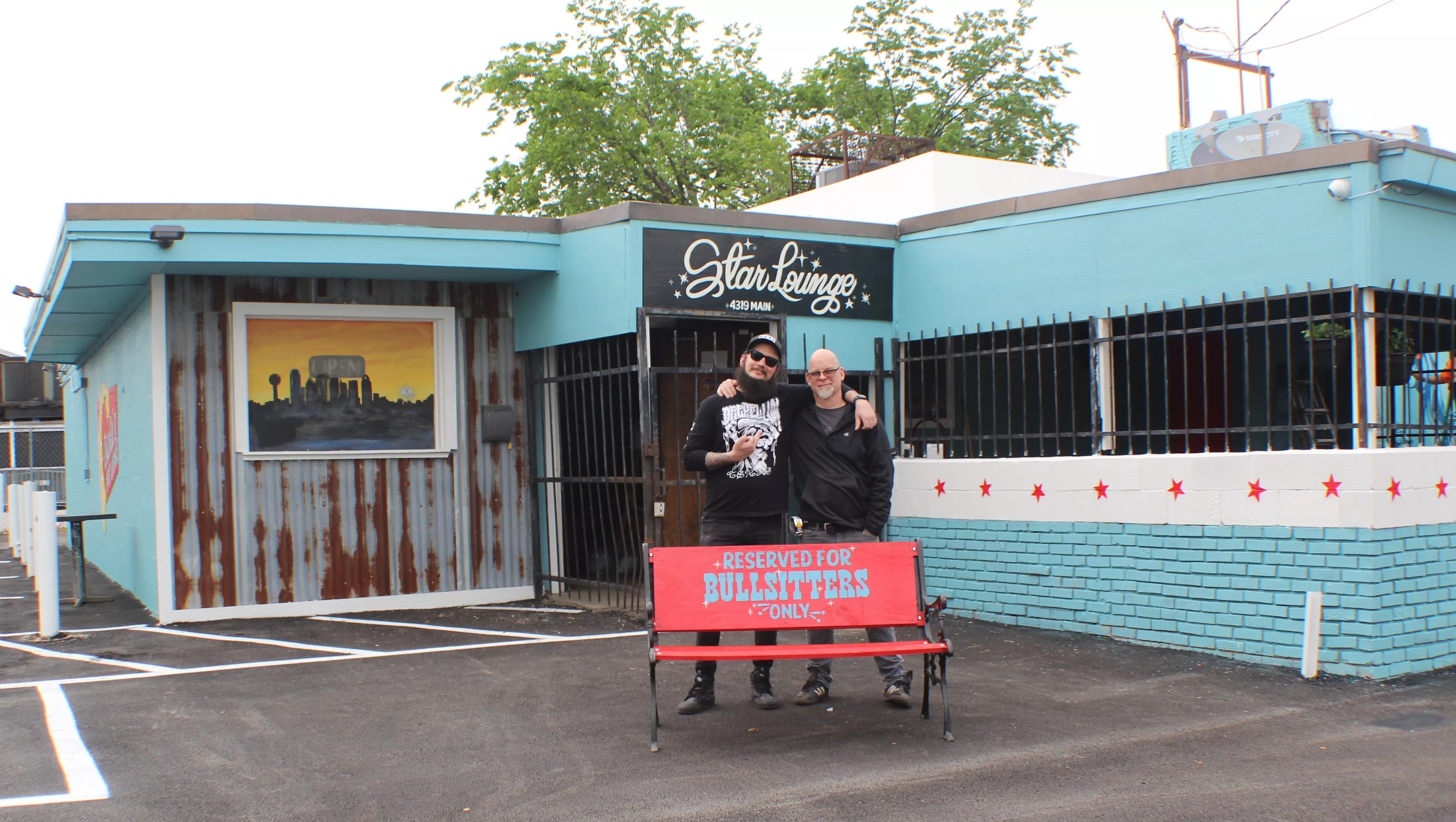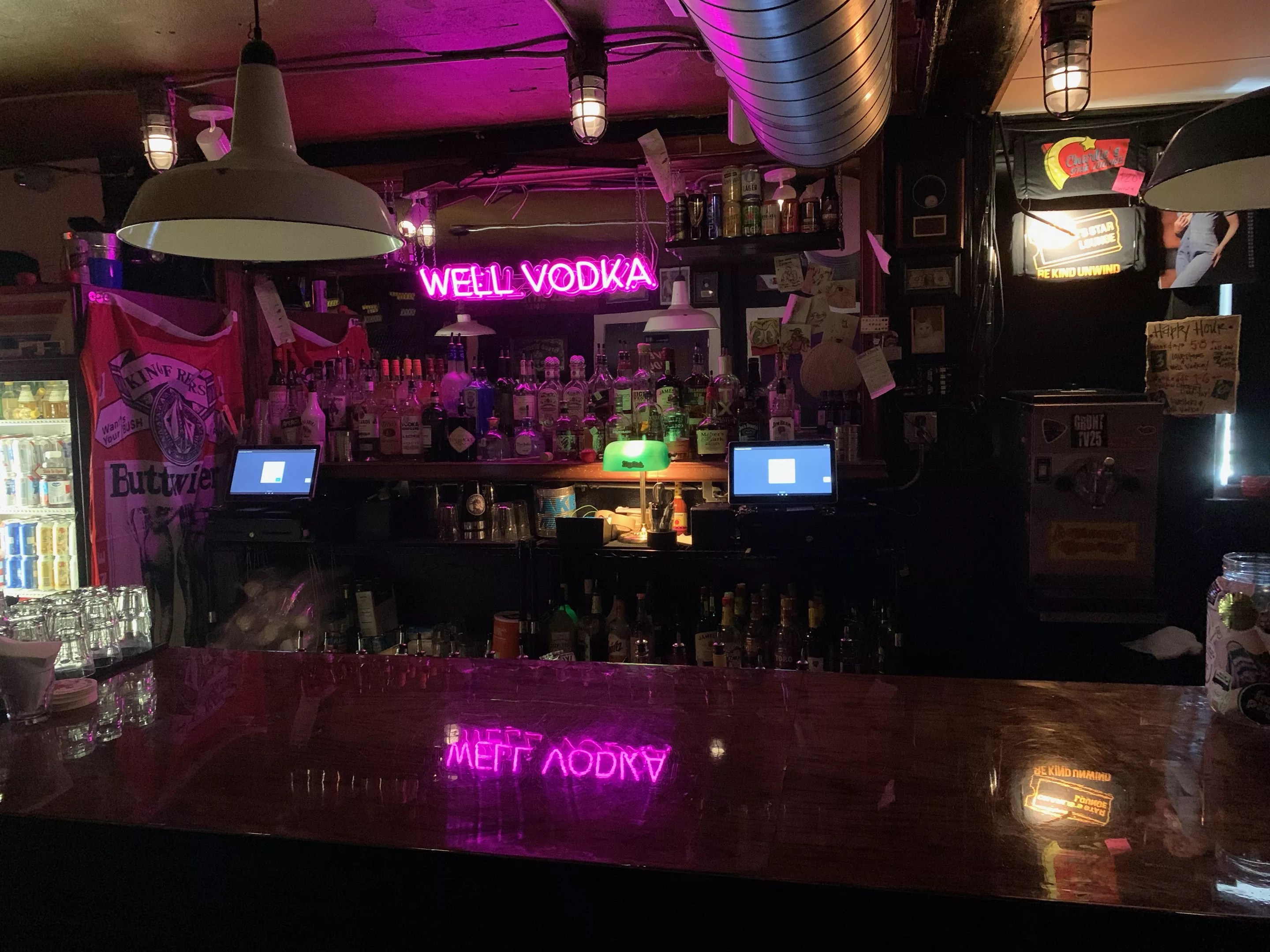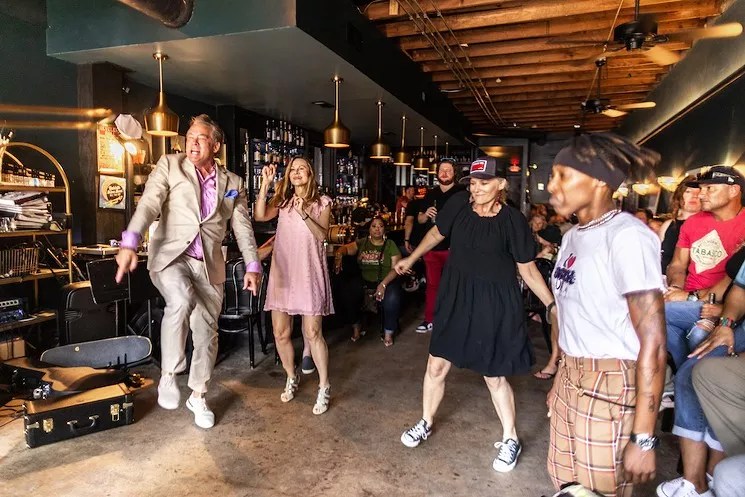
Charlie Binks

Audio By Carbonatix
(Editor’s note: We’ve put together a list of the 100 Best Bars in DFW, according to … well … us. Curious to know why we chose some spots? Strong support for local music was one reason. Read on to see what we mean by that.)
Bars are a pillar upon which a city’s culture is built. They provide stages and meditative spaces for writers and artists and propel careers for entertainers and entire art movements. They’re where we meet one-night (or whole-life) stands, dance to live music and embarrass ourselves by drinking like there’s no tomorrow – until we find out the next day there is a tomorrow, one filled with a headache and regret. Most important, they give our drinking habits a bit of respectability by presenting them as “social.”
We’re glad they’re back, and though a few old drinking buddies didn’t survive, others found creative ways to hang in until the happy days were here again. For some, the goal wasn’t just their own survival: They worked to support local musicians until stages could open again.
No matter how you describe your bar of choice – joint, tavern, cantina, saloon, pub, dive, watering hole – business signs are slowly turning to read “open” again, and Dallasites are once more racking up tabs. According to tax data on the Texas.gov website, Dallas people spent nearly $77 million on drinks at restaurants and bars in April, comparable to 2019 prepandemic sales in the same month. In April 2020, sales didn’t reach $4 million.
Venues and performers that were nearly dormant but surviving through livestreams and fundraising are thriving again as we celebrate vaccines and the pandemic’s slow denouement.
COVID-19 brought an end to Dallas institutions such as dance club Lizard Lounge, Black Swan Saloon and Beauty Bar, but we gained some new ones. Charlie’s Star Lounge, 4319 Main St., is the creation of co-owners Allen Falkner and Corey Howe, who own and manage, respectively, The Nines, a club at 2911 Main St. in Deep Ellum.

The atmosphere at Charlie’s Star Lounge was inspired by co-owner Corey Howe’s garage house party-heavy childhood.
Charlie Binks
Formerly the Starlight Lounge, which had lived under that name since 1996 in a building standing since the 1950s, Charlie’s now glows with the warmth of a trucker bar.
After shopping around for a place to set up bar, the pair closed on the deal with Starlight around November 2019 and expected to be open March or April 2020. That didn’t quite happen.
The extra wait didn’t send Howe into a panic. He says it gave them time to complete renovations.
“Financially, it wasn’t the easiest option because you’re spending a lot of money and time, redoing everything with no real end in sight for opening,” he says. “And then, basically, we knocked out all the gnarly construction. New bathroom, the electrical, the plumbing, like, pretty much everything, down to the studs.”
Howe and Falkner did as much handy work as they could, he says, and there were some delays with contractors, but their efforts came to fruition, finally, at the end of April.
“Even though it sucks, waiting and waiting and waiting and waiting and waiting,” Howe says, “I think that we opened up right at the perfect time. I think the weather was good. I think that people were more comfortable hanging out. You know, all my employees were finally vaccinated at both spots.”
Howe had a specifically dive-y ambiance in mind.
“My vision for Charlie’s was a collection of a lot of things that’s a really important story to me,” Howe says. “I grew up with my father and his stepfather who were, like, best friends. And my grandfather had a garage and a pool table and neon lights and lingerie lady posters and old cars. And, you know, I grew up in that garage.”
Howe describes fond memories of fetching “red beer” and “blue beer” to his elders. Now the building’s façade honors the color palette in Howe’s youth with a blue exterior and red stars.
The bar owners built a concept around that kitsch-Americana nostalgia, “the sound of, like, popping bottles and bottles breaking and trash cans and music and neons,” Howe says. “Charlie’s is that kind of, like, house party garage,” he says. “I didn’t want any frills. I didn’t want any draft beer, you know? I just want canned beer and liquor and a frozen drink.”
Falkner shared the same vision.
“Our goal when building it was to try and keep as much of the Starlight Lounge character and build a place we would want to hang out in,” he says. “I’m a big fan of dive bars, but it’s really hard to get just the right balance – too gritty and no one really wants to hang out there, and yet too new and nice and you lose the dive bar vibe.”
Howe is a musician with the band Dead Flowers and is preparing the bar’s stage for live acts. Charlie’s started bringing in the music first with karaoke on Friday nights and DJs such as Wanz Dover and Ursa Minor, who recently had the dance floor popping with breakdancers.
For now, Howe is letting the audience set the pace.
“When we first were opening, I didn’t know if people wanted to be in a small room together – and it’s a very small room,” Howe says. “We’re seeing that even though it’s 100 degrees outside, people are still choosing to stay outside and kind of social distance. I mean, people are still figuring it out and not even in regards to COVID-19, but you’ve been locked up by yourself for a year … you may not be ready to be in a crowd with 60 people, let alone 200.”
Revenue is exceeding the owners’ expectations, Howe says, and has “flown over” their bottom line, which will allow him to book more acts.

New Orleans-flavored jazz bar Revelers Hall found ingenious ways to keep its musicians employed during pandemic shutdowns.
Kathy Traan
“I’m excited about just figuring out a way to do it to where artists can make enough money,” he says. “I think you get a better party out of it. If it was me DJing, it would be like, Peaches, The Replacements and, like, Bob Dylan, and the place would be empty. You know, I’m not the guy for that job.”
During the pandemic, New Orleans-flavored jazz bar Revelers Hall, 412 N. Bishop Ave., had one primary worry: keeping their musicians employed.
Co-owner Amy Cowan says the Bishop Arts bar stayed afloat by turning its sister business, the restaurant Oddfellows, into an outdoor market and selling food and drinks to go. For about six weeks of lockdowns, she set up musicians to livestream at the venue, allowing patrons to support them online, buy their albums or merch and even shots or rounds of beer.
“A lot of our musicians are obviously gig employees and filing for unemployment was not a smooth or easy process for them,” she says. “So their income was literally stepped out and we didn’t really have a lot of choices. Desperation will make you get creative real quick.”
As restrictions loosened, they were able to serve customers outdoors. Cowan’s business partner Jason Roberts petitioned the city to set up a “parklet space” outside of Revelers Hall, converting parking spaces to outdoor seating, and she believes they were the “prototype” for a new Dallas trend.
The venue started using servers so customers could stay outside while accommodating new government regulations.
“We had to implement a doorman to keep capacity as low as we could,” Cowan says. “We just changed things and tweaked a few things and worked the outside seating and changed how we serve.”
The music lived on outside of Revelers and in neighboring spots.
“A lot of our gracious neighbors started hosting yard shows and lawn parties and things like that, so that helped them get out,” Cowan says.
As soon as they were able to, the group brought their music programming up in record speed.
“We pretty immediately went back to our seven-days-a-week schedule, mostly because the musicians needed that income,” Cowan says.
Save for a rare “unreasonable” customer, Cowan says, people were compliant and loyally supported the house bands.
“We were just really fortunate,” she says. “Thankful for everybody who advocated for us and, you know, delivered help where they could and supported our bands and musicians. And, really – just grateful.”